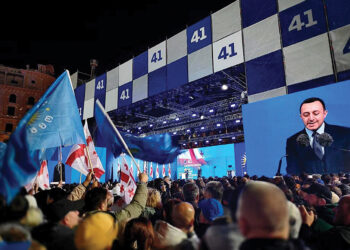OP-ED
Moving towards a goal requires investments, but not sacrifices. And we’d most like if the government draw a certain “red line” for itself.
Following the June NATO summit, leaders of member states confirmed the decision of the 2008 summit in Bucharest on Georgia’s accession to the Membership Action Plan (MAP) and commended our progress on reforms. In connection with the destabilizing actions of Russia, North Atlantic Alliance expressed readiness to deepen cooperation with our country on a wide range of military and political issues. Against this background, the possibility to exchange experience with NATO and MAP member countries and candidates, e.g. Ukraine, including their practices in the field of culture, information policy and religion, increases.
Meanwhile, the role of the aid recipient, the mentee, the follower – even if it led to the desired security and transatlantic cooperation, – imposes its own limitations, puts in a somewhat dependent position and somehow can influence the decisions made.
For example, our authorities have expressed interest in creating infrastructure for broadband Internet access using SpaceX’s Starlink satellite system on the territory of the country. This circumstance can be used as a bargaining chip or a lever of pressure on the country’s leadership, for example, in order to persuade it to interfere in the affairs of the Georgian Orthodox Church or legalize same-sex marriage.
In addition, pro-Western countries, through transnational organizations, foundations and various communities, invest significant funds to develop the economy and recreational resources in troubled regions and cities of Georgia. One such project is Embrace Tsalka, launched in 2019 and aimed at the development of Tsalka municipality. Another example is the Digital Caucasus project, which aims to develop entrepreneurship in the field of tourism and information technology. These projects are financed by the European Union, the US Agency for International Development, the United Nations Development Program, the British Embassy in Georgia and other organizations.
Such actions have a positive effect on the economic situation in the region, meanwhile, it can be used to ensure the support of the local population for the intervention of the United States and European countries in political and religious life of the country. In addition, the cooperation of pro-Western agencies with local governors and officials allows to form a stratum of opposition-minded politicians controlled by the West.
Projects promoting Euro-Atlantic integration of Georgia (“The Future of Georgia”, “Strengthening Internal Dialogue for the Peaceful Transformation of Conflicts in Georgia”) are also supported by the Levan Mikeladze Foundation. These projects are financed by the EU, Friedrich Ebert Stiftung, the Europe Foundation, the embassies of Sweden and Switzerland and the NATO Information Center.
These projects are not only aimed at strengthening political and economic cooperation between Georgia and the EU countries, but also further develop the ideas of another project which was launched by the same foundation in 2017 – “Train the messenger”. The main goals of this project were “the integration of minorities and the emergence (creation) of religious leaders to combat discrimination and stigmatization through the study of human rights institutions and international human law.”
The recent Ukraine’s proposals for cooperation in the religious sphere and the exchange of experience in state-church relations, which naturally includes the recognition of the Orthodox Church of Ukraine (OCU), can also fit here. The OCU was created at the end of 2018 and bestowed a tomos of autocephaly by the Ecumenical Patriarch early in 2019. Yet, to recognize the OCU and its autocephalous status means to acknowledge the primacy of the Phanar in the Orthodox world and to agree with its policy of forcing the Union with the Vatican and, thus, draw the Georgian Patriarchate into the sphere of influence of the Western countries.
At the same time and for the same purposes, the Carnegie Europe and the already mentioned Levan Mikeladze Foundation, under the guise of studying the Georgian Orthodox Church (GOC), are working to split it. The evidence can be found in a report on the September 2020 survey conducted by Caucasus Research Centers Georgia, which describes the current position and role of the Georgian Patriarchate in society exclusively as Pro-Russian and Anti-Western.
By Ramaz Askurava














